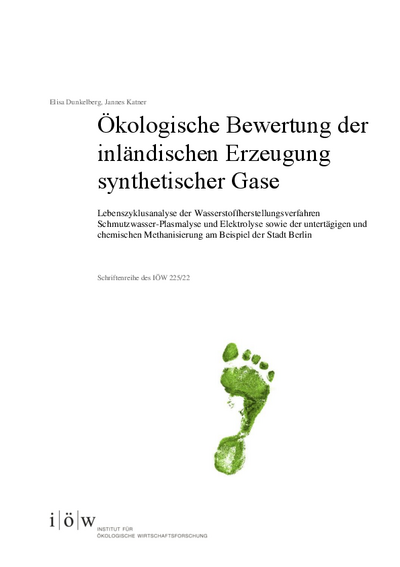Ecological assessment of domestic production of synthetic gases Life cycle assessment of hydrogen production using the processes of waste water plasmalysis and electrolysis as well as pf methane production using the processes of underground and chemical methanation
In 2021, fossil fuels still accounted for more than 80 percent of primary energy consumption in Germany. Although a significant reduction in gas consumption is indispensable for climate protection goals and for greater security of supply, gas will continue to be needed in the future, for example in industry, in district heating and as an energy storage medium. This demand will have to be met by hydrogen and synthetic methane, as well as partly by biomethane. In addition to hydrogen imports, domestic production of such gases can make a contribution. The study compares life cycle assessments (LCA) of two hydrogen production processes – wastewater plasmalysis and electrolysis – as well as two methane production processes – underground methanation and chemical methanation.
Using Berlin as an example, the LCA study shows under which framework conditions the investigated processes have environmental advantages compared to natural gas. Various site concepts and electricity mixes are presented as variants. The results show: Of the hydrogen production variants considered, wastewater plasmalysis with an electricity mix of wind and PV causes the lowest ecological burdens in the impact categories examined. The electrolysis process is also recommended, especially with regard to the climate impact, provided that the waste heat from the electrolysis can be used and renewable electricity is used for operation. In methane production, both underground methanation and chemical methanation can achieve a significant reduction in greenhouse gas emissions compared to natural gas. The prerequisite for this is that renewable electricity is used both in the production of the required hydrogen and in the methanation process.
An underground natural gas storage facility in Berlin-Charlottenburg, which has been shut down since 2017, serves as a case study: the project investigated whether it could be used in the future as an energy storage facility for electricity from renewable sources using the power-to-gas principle. It turned out that this location does not offer optimal conditions for underground methanisation. However, the process should be further investigated and tested for other sites. In Berlin and in cities in general, hydrogen production with plasmalysis and electrolysis is recommended from an ecological point of view because waste heat potentials can be used well, especially in urban areas.



